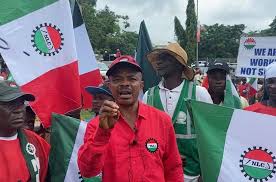Negotiations over the national minimum wage reached another deadlock on Friday after two days of discussions.
The Federal Government’s negotiating team raised its offer by N2,000, bringing its total minimum wage proposal to N62,000, while the Organised Labour reduced its demand to N250,000 from N494,000.
During the negotiations, state governors declared their inability to pay even the previously proposed N60,000 minimum wage, which the Federal Government later increased by N2,000. The Organised Private Sector (OPS) supported the government’s offer.
READ ALSO: Minimum Wage: FG Offers Additional N2, 000 As Tripartite Committee Concludes Sitting
Due to the disagreement, the Tripartite Committee on the New National Minimum Wage (NNMW) adjourned. A source indicated, “There was disagreement on the amount. The government offered N62,000, but Labour is now demanding N250,000. The report is to be communicated to the President for further deliberation.”
Before the Federal Government raised its offer to N62,000, the Nigeria Governors Forum (NGF) stated that the N60,000 minimum wage proposed by the Federal Government was unsustainable. They argued that attempting to implement this wage would force many states to borrow funds monthly to pay workers, which would not be in the collective interest of the country, including the workers.
In a statement issued on Friday by NGF Acting Director of Media and Public Affairs, Hajiya Halimah Salihu Ahmed, titled “The forum’s stand on the N60,000 minimum wage not sustainable: NGF,” the governors elaborated on their concerns. The statement read:
READ ALSO: We Can’t Pay Proposed N60,000 Minimum Wage – Governors
“The Nigeria Governors’ Forum (NGF) agrees that a new minimum wage is due. The Forum also sympathizes with labor unions in their push for higher wages.
However, the Forum urges all parties to consider the fact that the minimum wage negotiations also involve consequential adjustments across all cadres, including pensioners.
The NGF cautions parties in this important discussion to look beyond just signing a document for the sake of it; any agreement to be signed should be sustainable and realistic.
READ ALSO: Governors Limit Minimum Wage Proposal At N70,000
All things considered, the NGF holds that the N60,000 minimum wage proposal is not sustainable and cannot fly. It will simply mean that many states will spend all their FAAC allocations on just paying salaries, with nothing left for development purposes. In fact, a few states will end up borrowing to pay workers every month.
We do not think this will be in the collective interest of the country, including workers. We appeal that all parties involved, especially the labor unions, consider all the socioeconomic variables and settle for an agreement that is sustainable, durable, and fair to all other segments of society who have a legitimate claim to public resources.”
The organized labor unions, including the Nigeria Labour Congress (NLC) and Trade Union Congress (TUC), had suspended their strike for five days starting Tuesday. The strike, which began on Monday, was in protest of the Federal Government’s failure to approve a new minimum wage by May 31 and to reverse the hike in electricity tariffs.
READ ALSO: Presidency Denies Reports of Proposed N105,000 Minimum Wage
Following a six-hour meeting with labor leaders in Abuja on Monday night, the Federal Government expressed President Bola Tinubu’s commitment to raising the N60,000 minimum wage offer.
The agreement stated, “The President of Nigeria, Commander-in-Chief of the Armed Forces, is committed to establishing a national minimum wage higher than N60,000, and the Tripartite Committee will convene daily for the next week to finalize an agreeable national minimum wage.”
The organized labor also agreed to hold meetings of its organs to consider the new offer and assured that no worker would face victimization for participating in the industrial action.
These resolutions were signed on behalf of the Federal Government by the Minister of Information and National Orientation, Mohammed Idris, and the Minister of State for Labour and Employment, Nkeiruka Onyejeocha.
The court has fixed July 3 for a hearing of the substantive suit brought by the plaintiff, further extending the timeline for resolving the minimum wage dispute.
